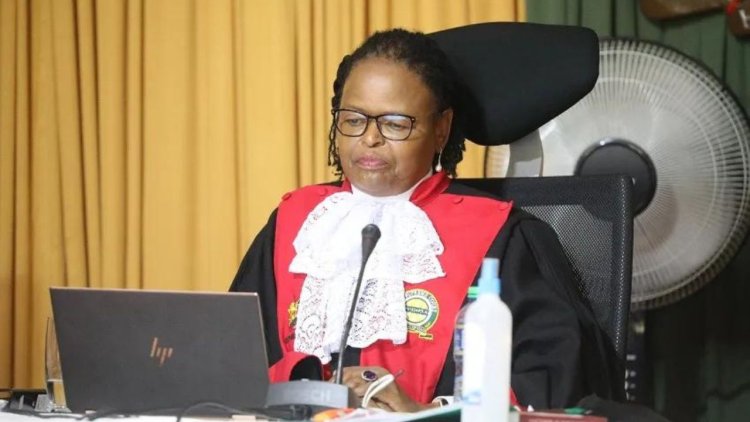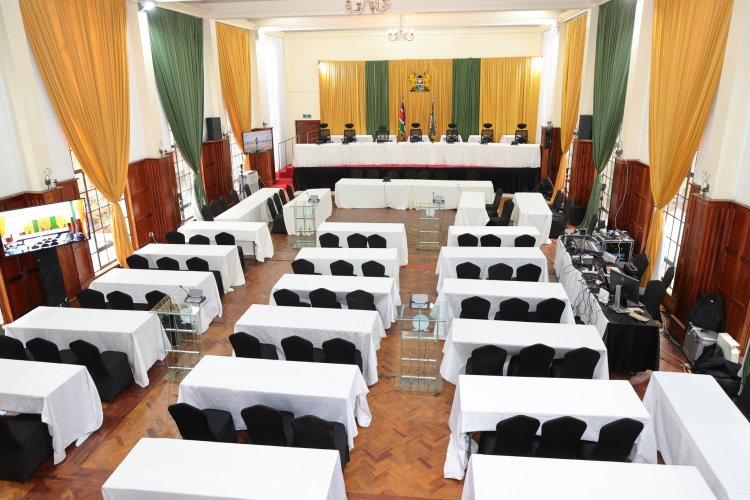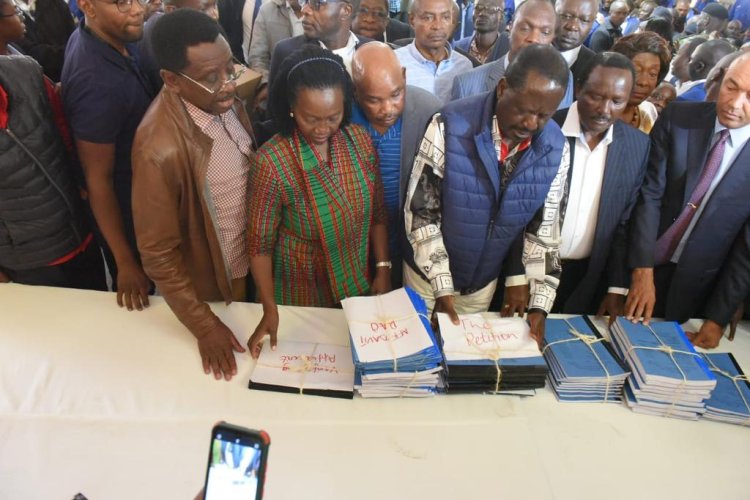CJ Koome Trims Number Of Petitions Against Ruto's Election
The 7 petitions filed seeking to invalidate Ruto's victory have been consolidated into one single petition.

The Supreme Court of Kenya has restructured the presidential petitions filed against the declaration of William Ruto as president-elect.
The 7 petitions filed seeking to invalidate Ruto's victory have been consolidated into one single petition.
Moreover, former Prime Minister Raila Odinga's petition has been given priority status, which is the primary petitioner in the case.
"We find that all those petitions raise similar issues and seek similar orders. Therefore we order that the 7 petitions are consolidated.

Inside the Supreme Court of Kenya ahead of the hearing of the presidential petitions. /ZAKHEEM RAJAN
"The ending of the matter will therefore read as Raila Odinga and Martha Karua as the first petitioners," CJ Koome said during the pre-trial session on Tuesday, August 30.
Two petitions were struck out earlier in the morning, reducing the petitions from nine to seven.
"After we dealt with the preliminaries two petitions were struck out, petition number E006 and E009 and the rulings were delivered, followed by a summary showing the reasons why they were struck out.
"The main petitioner - Raila has been allocated three hours while the supporting petitioners were allocated 30 minutes," she added.
The number of lawyers representing Raila Odinga, William Ruto, and the Independent Electoral and Boundaries Commission (IEBC) have been reduced to four each, with the move occasioned by COVID-19 protocols, limited space, security and time.
The main petitioner - Raila has been allocated three hours while the supporting petitioners were allocated 30 minutes each.
IEBC commissioners who rejected the declaration of Ruto as President-elect - Juliana Cherera, Francis Wanderi, Irene Cherop, and Justus Nyang'aya were given an hour to make their submissions as the Court included them as respondents. The lead counsel of the four will have 15 minutes each.
Legal representatives of the IEBC and Chairperson Wafula Chebukati were given three hours which will be shared among them.
Ruto's lawyers will also have three hours to give their responses before the Court. Attorney General Paul Kihara was given 30 minutes.
Issues to be determined by Supreme Court:
- Whether the election met standards of integrity and credibility as per the Constitution
- Whether there was interference with the transmission of forms 34A from polling stations to the IEBC portal
- Whether there was a difference between forms 34A uploaded on the IEBC portal and those received at the National Tallying Centre from polling stations.
- Whether postponement of gubernatorial, parliamentary and ward elections amounted to voter suppression to the detriment of Raila Odinga and Martha Karua.
- Whether there is an unexplained discrepancy between votes cast for the Presidential election and other elective positions.
- Whether IEBC carried out tallying and verification of forms in line with the Constitution.
- Whether the President-Elect, William Ruto, attained the 50 per cent plus one vote threshold.
- Whether irregularities were of such magnitude to affect the outcome of the election.
- What orders the Supreme Court can issue
Ground rules of the court:
- Parties and advocates to observe punctuality to the time set for the start of proceedings, and time allocated on the screen
- Counsels to continue being respectful and adhere to the rules of the court
- Parties are expected to conduct themselves with decorum and respect the dignity of the court.
- Discussion of the merits of the case by parties or counsels out of the court is not permitted
- Courtesy to be observed; the court will not tolerate offensive languages
- Time unspent will belong to the court and the counsel will not be allowed to 'donate'
- There will be no extension of time
- Parties urged to focus on pertinent points of their case to save time
- Unnecessary movement when session is on discouraged. However, individuals, including the bench, can take health breaks. The breaks will not stop the proceedings.

Raila Odinga presents his petition documents at Milimani Law Courts. /TWITTER






